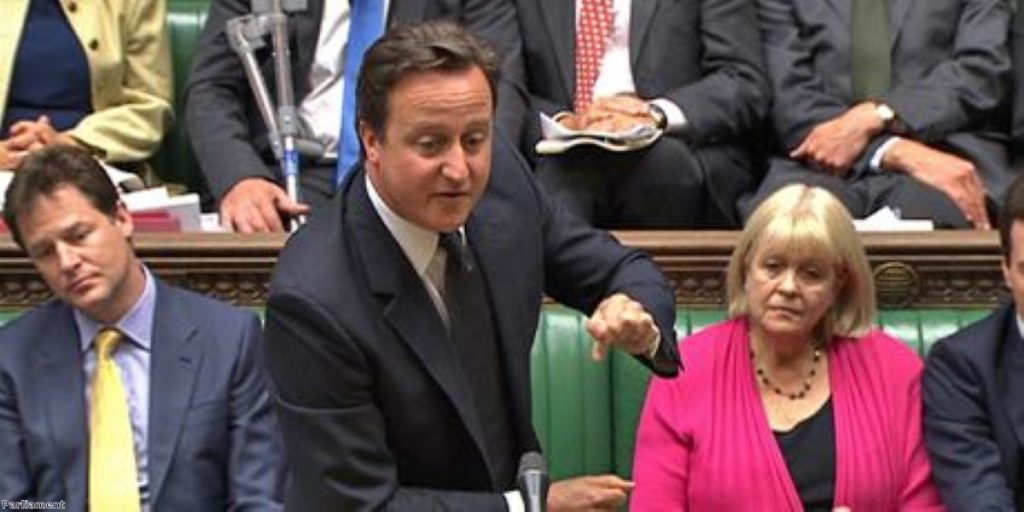PMQs verdict: Cameron uses the law as a shield, but forgets to cover his legs
First David Cameron did not want to set up a judge-led inquiry. Then he set up a judge-led inquiry. Then the judge-led inquiry said it could not discuss matters of Andy Coulson which related to a possible court case on phone-hacking. Then the judge-led inquiry exonerated Cameron. Then there was a court case. The court case went badly for Cameron. His former director of communication was found guilty of conspiracy to hack phones. Then Cameron used the judge-led inquiry to avoid questions about the court case which the judge-led inquiry anyway couldn't comment on.
The law is a shield for the prime minister, but he did not use it elegantly. Worse, he forgot to cover his legs.
As PMQs wore on, news dripped in that the remainder of the Coulson case had collapsed, with the jury unable to reach a verdict. The judge had offered the prime minister some choice words. His statement yesterday apologising for hiring Coulson suggested he had lied to him before being given the communications job in Downing Street. That affected Coulson's credibility, which is an important element of the case. Damningly, he said he didn't know whether the statement was "done in ignorance or done deliberately".
Coulson's lawyer accused the prime minister of an "astonishing and unprecedented" intervention which endangered his client's right to a fair trial. The PM's intervention clearly came close to ending the case altogether, had the jury's failure to agree not delivered the same result.


It's a mess. But it is certainly true that the judiciary was doing more damage to the prime minister's reputation than the leader of the opposition.
Ed Miliband's problem was that he had nothing new to go on.
He asked about warnings from the editor of the Guardian and from the New York Times but it had been covered in Leveson. Cameron draped himself with the judge-led inquiry. He clanked it around him with padlocks. Not a word would emerge from his lips which had not previously been uttered by Lord Justice Leveson.
"I know he was very disappointed by Leveson, but he called for it and he should heed what it said," Cameron told the Labour leader.
There were more dignified ways to conduct identical operations. Cameron could have started each line with "as Leveson said" and then given detailed accounts of what was said in the inquiry. That would have at least seemed like it respected the seriousness of events. Instead, he came across as evasive and slippery. At one point he even criticised Miliband for being "desperate not to talk about the economy", which was silly and charmless of him.
The Labour leader came across as toothless. He just didn't have any new material to push the story forward.
In the end he settled for asking about the vetting process. Why had Coulson not been given the high-level vetting the six previous occupants of the post had?
The civil service made the decision, Cameron countered, and anyway Leveson already said no civil service vetting process was likely to get to the bottom of phone-hacking.
Had Gus O'Donnell, then Cabinet secretary, not warned Cameron about Coulson? This was the only area in which there was a touch of doubt, but it was not enough to make a solid case against Cameron.
The PM had a few cards up his sleeves too, mostly put there by Miliband himself. "Weak is attacking Murdoch and then posing with a copy of the Sun newspaper only to apologise a few hours later," he informed the Labour leader, not unfairly.
Chris Bryant over-hyped his own contribution, which amounted to little more than semantic pedantry. If Cameron admits he was giving Coulson a second chance, surely that implicitly admits he already knew he was guilty? Not so, Cameron replied. The second chance referred to the loss of his job at the tabloid. Nevertheless, given their relative roles in this long-running scandal, it was grotesque to see the prime minister tell the Labour MP that "on this issue he's got it wrong time and time and time again".
It was a nasty, scrappy PMQs, with isolated angry shouts from MPs throughout. There really wasn't much more Miliband could have done with what was available. The damage to Cameron, such as it is, had already been done. The outcome of the trial does not change much. But Labour clearly wanted more and Miliband will have been aware that the MPs behind him seemed much more sullen than those in front of him by the time the session ended.
Verdict: Miliband 1 Cameron 1












